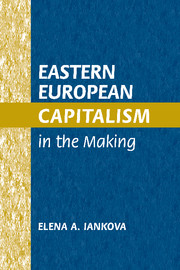Book contents
- Frontmatter
- Contents
- Acknowledgments
- List of Abbreviations
- 1 Hybrid Capitalism in the Making
- 2 The Corporatist Legacy of State Socialism
- 3 Bulgaria's National Tripartism
- 4 National Social Dialogue in Poland
- 5 The Politics of Sectoral Tripartism
- 6 The Politics of Regional Tripartism
- 7 Conclusions: Transiency and Continuity
- Tables
- References
- Index
1 - Hybrid Capitalism in the Making
Published online by Cambridge University Press: 30 July 2009
- Frontmatter
- Contents
- Acknowledgments
- List of Abbreviations
- 1 Hybrid Capitalism in the Making
- 2 The Corporatist Legacy of State Socialism
- 3 Bulgaria's National Tripartism
- 4 National Social Dialogue in Poland
- 5 The Politics of Sectoral Tripartism
- 6 The Politics of Regional Tripartism
- 7 Conclusions: Transiency and Continuity
- Tables
- References
- Index
Summary
On the Transformation Track: Varieties of Capitalism and Tripartite Coordination
With the collapse of state socialism in 1989, the formerly communist countries of Eastern Europe initiated dramatic changes in their political and economic settings and state-society relations, in an attempt to claim a new place in a world characterized by globalization and increased regional integration within three economic blocs: the United States, Europe, and Japan/Asia. Ten years after the dramatic breakthrough of 1989, the nations of Central and Eastern Europe (hereafter CEE) are actively preparing for membership in the European Union (EU). Accession negotiations for the “fast-track” countries (Poland, Hungary, the Czech Republic, Slovenia, and Estonia) started in spring 1998, and those for the “slow-track” countries (Bulgaria, Slovakia, Romania, Latvia, and Lithuania) opened in February 2000.
The accelerated preparations for accession to full EU membership are cause for reflection on some old questions and consideration of some completely new ones. What is the direction of change in CEE, and what conditions frame and shape emerging capitalism in the region? Have the legacies of state socialism and postcommunist transformation brought into being a new form of capitalism? Alternatively, under the pressures of increased globalization and regional integration, could the nations of CEE be moving toward already established capitalist variants?
- Type
- Chapter
- Information
- Eastern European Capitalism in the Making , pp. 1 - 30Publisher: Cambridge University PressPrint publication year: 2002



